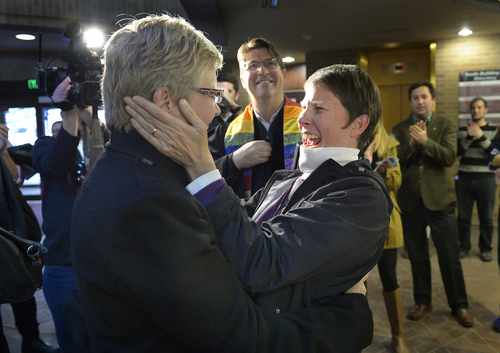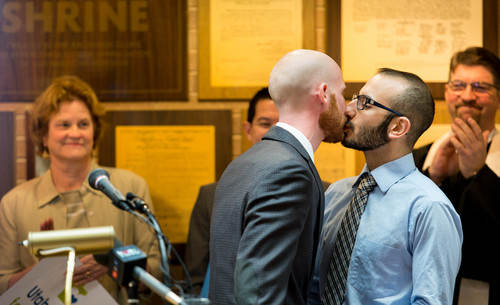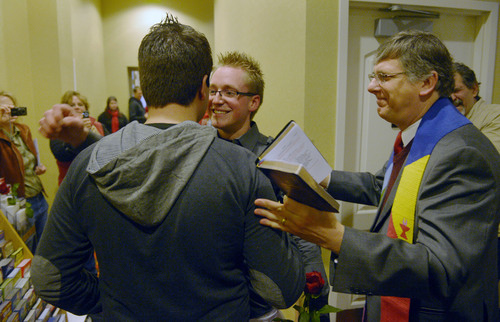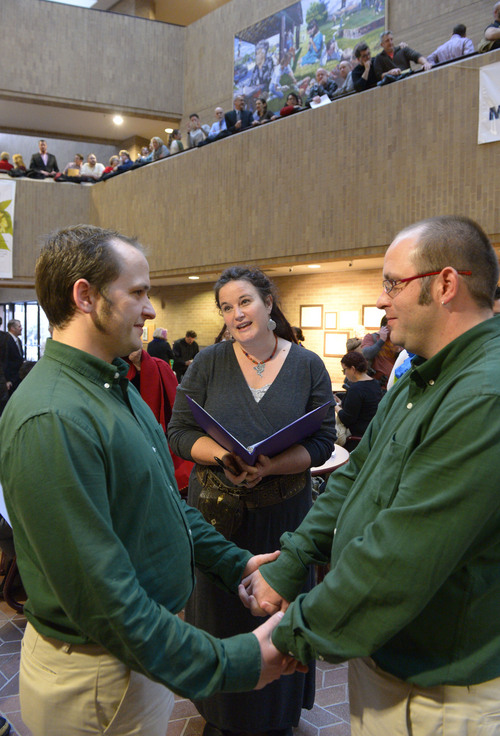This is an archived article that was published on sltrib.com in 2014, and information in the article may be outdated. It is provided only for personal research purposes and may not be reprinted.
For Utah, it's Supreme Court or bust.
After losing its appeal and becoming the first state in which a federal appeals court found marriage to be a fundamental right of all people — gay, straight or otherwise — Utah is done biding its time.
The state wants resolution and finality. And it wants it now.
This week, Utah bypassed another appeal to the full 10th Circuit.
The state will instead appeal directly to the U.S. Supreme Court "in coming weeks," the attorney general's office said.
The Kitchen v. Herbert lawsuit, which toppled Utah's same-sex marriage ban late last year, is the first state same sex marriage lawsuit to go through the appeals processes and is first in line to reach the Supreme Court.
But, experts warn, the path to the highest court in the country is anything but simple.
The U.S. Supreme Court, which is on its summer hiatus until October, has complete discretion over whether it will hear the case.
After Utah files its petition, the Supreme Court has options:
• The nine justices may choose to wait until a majority of the country's appellate courts have weighed in on the issue.
• They may take the case on its own or combine it with cases from other states and jurisdictions.
• Or they may reject the case — effectively allowing the 10th Circuit Court of Appeals' ruling to stand.
University of Utah law professor Cliff Rosky called same sex marriage "an issue of great social importance, of great national importance," and said that might be a reason the Supreme Court refuses to hear the case.
"So, one might think the court would want to take it on. ... But if you have a Supreme Court ruling where nine justices are dictating the law in all 50 states, that's not necessarily an ideal outcome," said Rosky, who sits on the board of Equality Utah.
Conflicting rulings among federal appeals courts could prompt the Supreme Court to hear Kitchen v. Herbert.
In 2006 the Eighth Circuit Court of Appeals — which covers Arkansas, Iowa, Minnesota, Missouri, Nebraska, North Dakota and South Dakota — overturned a lower court's ruling and upheld a ban on same-sex marriage.
That was seven years before the Supreme Court struck down the federal Defense of Marriage Act and, by virtue of its ruling, extended federal protections to married same-sex couples.
The national and political landscape, experts said, has changed since then.
Although the high court could decide to remain quiet on the issue of state gay marriage bans, experts said, the momentum with which this issue has swept the country and the conflict in the circuits will demand action.
" If you wait for unanimous rulings in all circuits, theoretically, plaintiffs could win this circuit by circuit without the Supreme Court ever getting involved," Rosky said. "It may be the conservatives who don't want to let the liberals off the hook. All you need is four votes for the case to be heard, and so, you might have conservative judges saying, 'This is about the legitimacy of the court and the court's role in that country. We believe the Constitution does not speak to gay and does not speak to marriage, and certainly doesn't speak to gay marriage. If you want to abuse the constitution in this manner than we absolutely want to know why.' "
But by the time the nine justices reconvene in the fall, they may have more than one case to choose from.
Utah's historic Kitchen v. Herbert lawsuit seems likely to become the first such appeal to come before the Supreme Court, but rulings expected by the Fourth circuit — on the constitutionality of a same-sex marriage ban in Virginia — and the Sixth Circuit, which will hear arguments in early August, may also be contenders.
It's not unprecedented for the court to combine cases.
In the history-making Brown v. The Board of Education case that desegregated this nation's schools, five cases were combined from different states and circuits.
"There is a history of justices combining the cases they like most, or the cases in which they want to tackle the reasoning — perhaps they agree with the outcome but not with how the circuit got there," said University of Richmond law professor Carl Tobias, who specializes in the federal judiciary. "It's more likely that the court will wait to see what cases it gets on this issue, and not necessarily jump on the first one — in this case, Utah's."
SCOTUS Blog, arguably the most well-regarded news site that covers the Supreme Court, issued a prediction earlier this week on Twitter: The U.S. Supreme Court "will act on the Utah [same-sex marriage] petition by late 2014, likely grant it, hear argument in March 2015, and rule (5-4) in June 2015."
It did not say which way the vote would go.
"Everyone seems to be in a big hurry to get to the Supreme Court," Tobias said. "But I don't think the Supreme Court is in a big hurry to get to Utah's appeal."
Twitter: @Marissa_Jae —
Re-hiring lawyers for Utah
Before the same sex marriage case progresses the state will re-contract outside counsel Gene C. Schaerr, John Bursch and Monte Neil Stewart — whose services have already cost the state $300,000, and are expected to run a similar bill in Utah's push to the Supreme Court.









